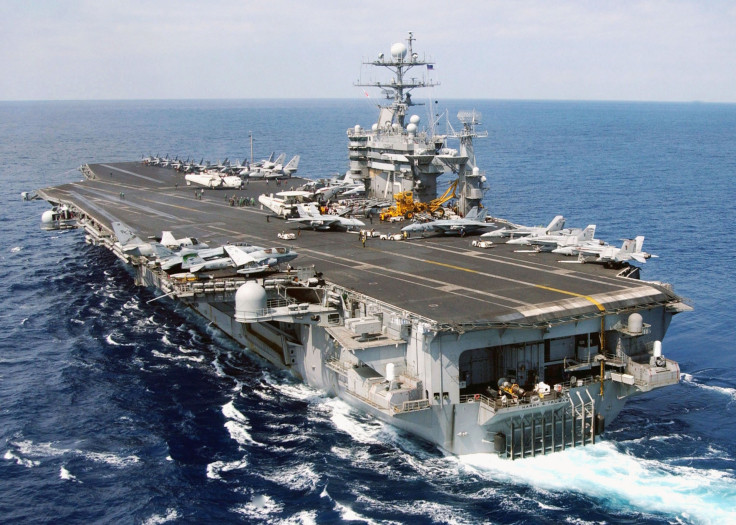Flying Aircraft Carriers Could Be Here Sooner Than You Think

For nearly half a decade, DARPA -- the Defense Advanced Research Projects Agency -- has been hard at work on a (not so) secret project: to build a flying aircraft carrier, a flying piloted "mother ship" capable of launching and recovering drone aircraft.
Little did DARPA know that two of its favorite contractors, defense companies AeroVironment(NASDAQ:AVAV) and Kratos Defense & Security (NASDAQ:KTOS), were about to go one better.
Introducing the flying drone aircraft carrier
For more than a decade, AeroVironment has been the name to beat in the production of small drones for the military. And Kratos Defense & Security is quickly becoming the biggest name in jet-powered, weaponized combat drones for the Air Force. Now these two leaders in drone tech have decided to team up and pool their expertise, creating a system of remotely piloted drones...launching other drones from midair.
The companies haven't yet settled upon a name for their project (that we know of) or published a date for first flight. What they have done, just last week, is published a press release announcing their intentions.
To wit, at some point in the (hopefully not-too-distant) future, Kratos will provide a "high-speed, low-cost attritable drone" -- perhaps one based on the UTAP-22 Mako drone that it exhibited at the Paris Air Show in 2017. AeroVironment will contribute one or more of its smaller "tube-launched small unmanned aircraft and tactical missile systems" -- probably a variant of its Switchblade kamikaze drone. Together, the companies will then try to demonstrate an in-flight launch of the latter from the former and, in so doing, inaugurate a new era in "low-cost, flexible intelligence, surveillance, reconnaissance and precision strike in near-peer denied combat environments."
Why do this at all?
Those last five words are key: "Near-peer" (China, Russia, and other potentially hostile nations armed with modern Chinese and Russian weaponry) "combat environments" are places becoming increasingly dangerous for manned U.S. fighter jets to operate. In addition to the risk to life and limb from anti-aircraft missiles, there's the PR hit that America might take when a downed pilot is captured and used for propaganda purposes.
In a nation as sensitive to such situations as America has become, therefore, certain airspaces around the world can come to be viewed as "denied" to aircraft carrying pilots in the cockpit. And yet the U.S. must be able to operate in such environments in order to exert influence internationally.
This is how the idea of remotely operated, pilotless "drone aircraft" became so popular. And if one drone can carry other drones, to be released over a target to operate independently, then that's a real force multiplier that the U.S. military might find attractive -- or at least, so Kratos and AeroVironment hope. (And DARPA's interest in building "flying aircraft carriers" would tend to support that view.)
As Kratos Unmanned Systems Division President Steve Fendley explains, "Kratos and AeroVironment offer complementary capabilities while sharing an intense focus on disruptive and affordable unmanned aircraft solutions for the DoD." AeroVironment's incredibly popular Switchblade (and its variants), loaded aboard Kratos Mako -- and Valkyrie, Thanatos, and Aethon -- drones, could be exactly the solution the Pentagon is looking for.
Mass quantities could mean mass profits
So what does all of this mean to investors? So far, Kratos and AeroVironment appear to be just "planting a flag" -- signaling a desire to develop this capability for the military and an intention to lead in this nascent market. No date has been set for a demonstration of the technology, however, nor even any specific drones named to participate in the project.
That being said, comments from AeroVironment UAS Vice President Trace Stevenson hint at the possibilities: "We aim to demonstrate the deployment of large quantities of smart systems that overwhelm and disable enemy systems."
And the larger the quantities of these flying aircraft carrier drones the Pentagon buys, the larger the profits should be for Kratos and AeroVironment shareholders.
Rich Smith has no position in any of the stocks mentioned. The Motley Fool recommends AeroVironment. The Motley Fool has a disclosure policy.
This article originally appeared in The Motley Fool.



















